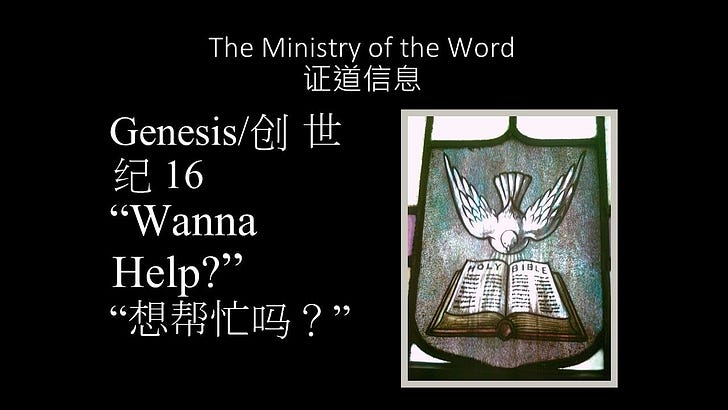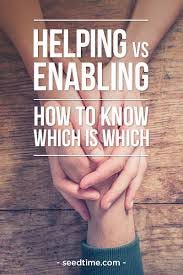Are You a Helper or an Enabler?
Be careful what you help people do. Should we help someone who is out of money and out of food? What if he doesn’t keep a job because he doesn’t want to work? Helping means actually doing what’s good for others. Enabling means doing what they want.
In a dysfunctional family, the members enable the problems. Enablers accept excuses. They won’t pour the whiskey down the sink or take away the computer (from which family members get porn or carry on affairs). They won’t confront the problem and tell the truth. A man who wanted to stay in church with us but his wife refused. He came to me and told me all the ways that I could go to her and grovel, hopefully to get her to return to us. I asked him if he had talked to her about these things and her unwillingness to follow him. He looked like a deer in the headlights, terrified by the idea. He was an enabler. He eventually followed his wife, enabling her. He’s now a “deacon” at a Danville, Virginia church.
For more on the enabler who followed his wife and is now a deacon, see:
Open Letter to a Danville Church in Error
A man wanted his pastor to grovel before his wife to get her to come back to his church. When the pastor wouldn't, the man followed his wife away from the church he was a covenanted member of, submitted to her leadership, and refused to confront her. The next church (in Danville, VA) made him a deacon. This is the letter sent to the church that is enabling the man who enabled his rebellious wife.
Those who want to remain in their sin will realize that the light will shine into their lives and expose all the dysfunctional darkness. They will not stay in a Biblical church. In a Biblical church, the Word of God reveals sin and reveals the God who doesn’t need our help.
To hear how to help ourselves (and how we don’t need to help God) listen:
Motherhood (16:1-5)
Genesis 16 begins with a dysfunctional wife who only wants to help. If Abram is going to be a father, he’s going to need some help from someone other than Sarai. Sarai thought she could help the Lord make herself a mother but she realizes, in the smug look in Hagar’s face, that this wasn’t her child.
In Galatians 4, the Apostle Paul uses this story to show us what our attempts to help God with legalism are like. Helping God out is exactly what Paul calls being “of the flesh”, dependent on our own efforts. Some people think they can help God out with rules they make up. Colossians 2:21 says regulations about “Do not handle, Do not taste, Do not touch” “are of no value in stopping the indulgence of the flesh.” Some people think they can help God save people with altar calls, “sinner’s prayers,” emotional manipulation, etc.
To hear more about how religion often tries to help God and does more harm, listen to the YouTube link above.
Fatherhood (16:6)
Sarai takes the lead and is the dominate character. When her plan doesn’t turn out like she wanted, she blames Abram, like a manipulator who won’t take responsibility. Abram is enabling her. He should have taken the lead. He forfeits his responsibility and tells her “do to her as you please.”
Dysfunctional marriages often have wives who take the lead, make the decisions, enable the children’s lack of discipline, covering for them, over-ruling the father. The father may, for a time, enable it, to get along, to get a superficial peace, thinking it helps the relationship, or to get sex. But he’s enabling the eventual demise of the marriage because eventually he will hate being treated disrespectfully and resent the woman for what he enabled her to do for years.
Many people think everyone, even God, should help preserve their miserably balanced dysfunctional world.
To hear more about how real fatherhood shouldn’t enable, listen to the YouTube link above.
Godhood (16:7-16)
The God Who Hears
Hagar has been harshly treated. The angel of the Lord tells Hagar she should go back and promises her a multitude of descendants, like Abram’s promise but no land or blessing to the nations.
The child will be like the works of the flesh, untamable, uncontrollable, fierce and implacable, like a wild donkey (16:12). The works of the flesh are dissensions and divisions, conflicts.
The enabler today chooses surface peace at any cost but lives in the perpetual, deep seated, simmering misery.
Ishmael means God hears. When it seems no one has heard you, the Lord has listened to your affliction. He is the God who hears.
The God Who Sees
God had seen her trouble. “To the outcast on her knees, He is the God who really sees” (“El Shaddai”). Listen to the song:
Dysfunctional families and dysfunctional churches want superficial relationships, where enablers keep the miserable balance and their deep, dark secrets hidden.
Dysfunctional families and dysfunctional churches want superficial relationships, where if you’re not a perpetrator, at least you’re an enabler, helping to keep the miserable (and sinful) balance and their deep, dark secrets hidden. But God sees through all that and expects us to live like we know it. We can keep out the gaze of others for a while but God sees always. He sees through our closed doors. He sees past our band-aids, our masks, our fakery. He sees our secret thoughts, our motives, our hearts. When we’ve fooled everyone else, He sees. He sees what’s really going on even when we’re keeping the rules, “do not handle, do not taste, do not touch.” Even if we keep them all, He sees us inwardly congratulating ourselves and thinking that we’ve helped God save us. He sees the pride. He sees to the bottom of our hearts and sees that our hearts are in bondage to sin; that we are helpless. He sees that we need a Savior.
To hear more how God is sees who you really are, listen to the YouTube link above.
The God Who Is Seen
God can be seen in what He does. We want Him to help us and don’t see Him helping us glorify Him. The Lord wants to fulfill His promise to Abram without human help. But He will help Hagar.
God is seen in Jesus. God did what He tells Hagar to do here: He submitted Himself to a harsh master. He submitted to three nails and the mockery of a dysfunctional religion that believed it could help God with its rules and regulations even while it was hanging God on a cross.
He was the God who was seen, helping us have a forgiveness we could not help ourselves to. And helping us be able to do what we could never imagine doing before: submit to God. Do you want to help yourself? Stop trying to help Him; you can’t. Just trust Him and submit to Him now.
To hear more how God is seen in Jesus, listen to the YouTube link above.
Covenant Reformed Baptist Church is Caswell County’s/Danville’s Reformed Church.









